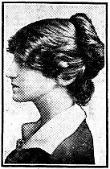Born the daughter of an Anglican clergyman (Rev. William Locke), Sumner Locke spent the first years of her childhood in Queensland before moving with her family to Melbourne in 1888. Described as 'a free spirit' with a bohemian 'outlook', Locke had a brief but promising career with a creative output that spanned a variety of literary forms. Noted as a novelist and playwright, Locke also wrote poetry, and her short stories appeared in various Australian publications such as the Bulletin and the Native Companion.
In 1908, her first play, 'The Vicissitudes of Vivienne', was performed in Melbourne; the Bulletin subsequently granted her 'the distinction of being the first Australian girl to get herself seriously considered as a playwright'. The following year, 'A Martyr to Principle' (which Locke co-wrote with Stanley McKay) and her one-act play 'The Quality of Mercy' were both staged in Sydney. Locke's first novel, Mum Dawson, 'Boss' (1911), was also adapted for the stage, when it was produced in Sydney by the Bert Bailey Company in 1917. Through her writing, Locke displayed an ability to humorously capture the trials and tribulations of farming life and country characters, and for this reason her 'selection life' stories have been regarded as a counterpart to the iconic work of Steele Rudd (q.v.). While she never attained the popular readership of Steele Rudd, Locke 'made her name' with Mum Dawson, 'Boss' which sold 21,000 copies. (Note: Listed plays were unpublished.)
In 1912, Locke departed for England where she sought to forge a literary career while working as a freelance journalist and short-story writer. During this time, she also formed a 'close and lasting friendship' with another expatriate Australian writer, Katharine Susannah Prichard. Locke spent three years overseas before news of her mother's ill health caused a return to Australia in 1915. While nursing her dying mother, Locke worked on her novel, Samaritan Mary (1916). Set in rural America, the book received 'rave reviews' when released in the United States and in the New York area alone sold more than 3,000 copies.
In February 1917, Locke married a childhood friend, Henry Logan Elliott. Just two weeks after their marriage, Elliott, an accountant and freelance journalist who had joined the A.I.F., received his orders to depart for the front in Europe. Prior to the wedding, Locke had booked a passage to America with the intent of meeting with her New York publisher, Henry Holt. In 1917, the then pregnant Locke undertook what was to be a lonely and exhausting journey across the United States with an itinerary that took in Arizona, New Mexico, New York, and Boston. Wanting to be reunited with her husband, she had planned to continue on to England but with the Atlantic closed to civilian passage Locke was forced to return to Sydney in early August.
On 18 October 1917, the day after giving birth to her first child, Sumner Locke died. A mourner at her funeral reportedly said, 'I hope the son will be worth the sacrifice.'
Locke is the mother of the successful playwright and novelist, Sumner Locke Elliott.
 8842045059040810257.jpg
8842045059040810257.jpg
